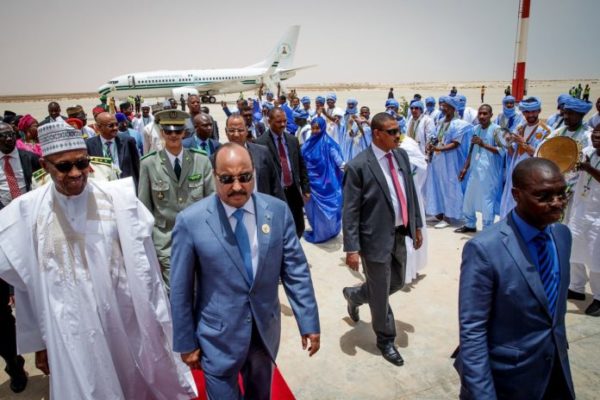South Africa and Nigeria join the ZLECA
On the occasion of this summit of the African Union, which is held in Nouakchott until July 2, Mauritania delivered on the wire the International Conference Center ” Al Mourabitoune ” with 5,000 places and 300 offices and spaces of presidential breaks for the trifle of 14 billion Ouguiyas or 35 million euros. The book, supervised directly by Mauritanian President Mohamed Ould Abdel Aziz, was produced by businessman Zeine Elabidine Ould Cheikh Ahmed, who is also president of the business. Realized in less than 10 months, this book is added to the airport Oum Tounsy, delivered two years ago by a local operator (Najah Works), thus confirming the capacity of the country to conduct large infrastructure projects with funding and local expertise.
Update on the Continental Free Trade Area. Four other countries (including Nigeria and South Africa) have signed at the bottom of the ZLECA text, bringing the number of signatories to 48. The adoption of this text is imminent but still bogged down on a few technical aspects: rules of origin, list of sensitive products, harmonization (standards) of products and services and, which constitutes the biggest blockage, lifting restrictions on mobility and the right of establishment. The chairman of the African Union Commission, Moussa Faki Mahamat, has called for the lifting of restrictions on visas.
The gifts. In addition to the Mauritanian and Rwandan presidents, who preside at the summit, there are among the 23 heads of state present in Nouakchott, Cyril Ramaphosa of South Africa, Mangagwa of Zimbabwe (who seeks support for the candidacy of Dr. Cosmas Zavazava, already supported by the SADC, post of director of the Telecommunication Development Bureau of ITU-elections next October) and Muhammadu Buhari of Nigeria, come to endorse his country’s accession to the ZLECA. His Nigerian neighbor, Muhammadu Issoufou, who is very active in integration side events, has been lobbying hard to bring Africa’s leading economy back into the integration process. South Africa has also endorsed the agreement, giving a tipping point to the largest free trade area in the world.Present at the top for the first time, the Sierra Leonean, Julius Maada Bio, signed its very first participation on the occasion of this summit.

The great absentees. Some 23 heads of state take part in the Nouakchott raid. Announced in recent weeks, King Mohammed VI of Morocco is finally represented by Nasser Bourita, Minister of Foreign Affairs. The summit, which was to consider a new settlement plan for the Sahara dispute, also saw the notable absence of long-time Egyptian President Abdel Fattah Sissi, who had announced his participation. The plethoric staff of the delegation to accompany the Raïs was a decisive parameter for a summit that requisitioned 5000 hotel rooms and furnished residences. Egypt is represented at the summit of Nouakchott by Sameh Shoukry, his Minister of Foreign Affairs.
The triumph of Rwanda. President of the African Union, Paul Kagame, certainly the foreign head of state, the most adulated by the Mauritanians, has achieved one of its major objectives: to endorse the candidacy of Louise Mushikiwabo, Rwandan Minister of Foreign Affairs by the Executive Council of the African Union as Secretary General of the International Organization of La Francophonie (OIF). A first that clearly disqualifies the Canadian Michaëlle Jean, current SG of the OIF.
The question of terrorism has been invited to the summit. The main theme on the fight against corruption and its appendices on equality between women and men (in partnership with the European Union) were jostled by the attack on the G5 headquarters in Sevare. Mali, which shares 2,300 km of borders with Mauritania, is the weakest link in G5 Sahel. Chaired by Nigerian Mouhamadou Issoufou, the G5 faces the challenge of financing.
Emmanuel Macron, grand guest of the African Union. Expected to Nouakchott in what will be the highlight of this 33rd summit in Nouakchott, the French president was to go to Kiffa (600 km east) to this border Mali which is the main point of security vulnerability of Mauritania.
The counter top of Nouakchott. Civil society organizations and political opponents organized a counter-summit on 29 June, the day before the meeting, to denounce cases of famine in the country. In addition, the group of widows of the military and civilians, victims of the events of 1989 – 1992 calls, in a letter, the heads of state on their fight for the truth on the assassinations committed on their close relations. The question of coexistence between African-Americans and Arabs has been a recurring problem since the country’s independence in 1960.
Dia El Haj Ibrahima




